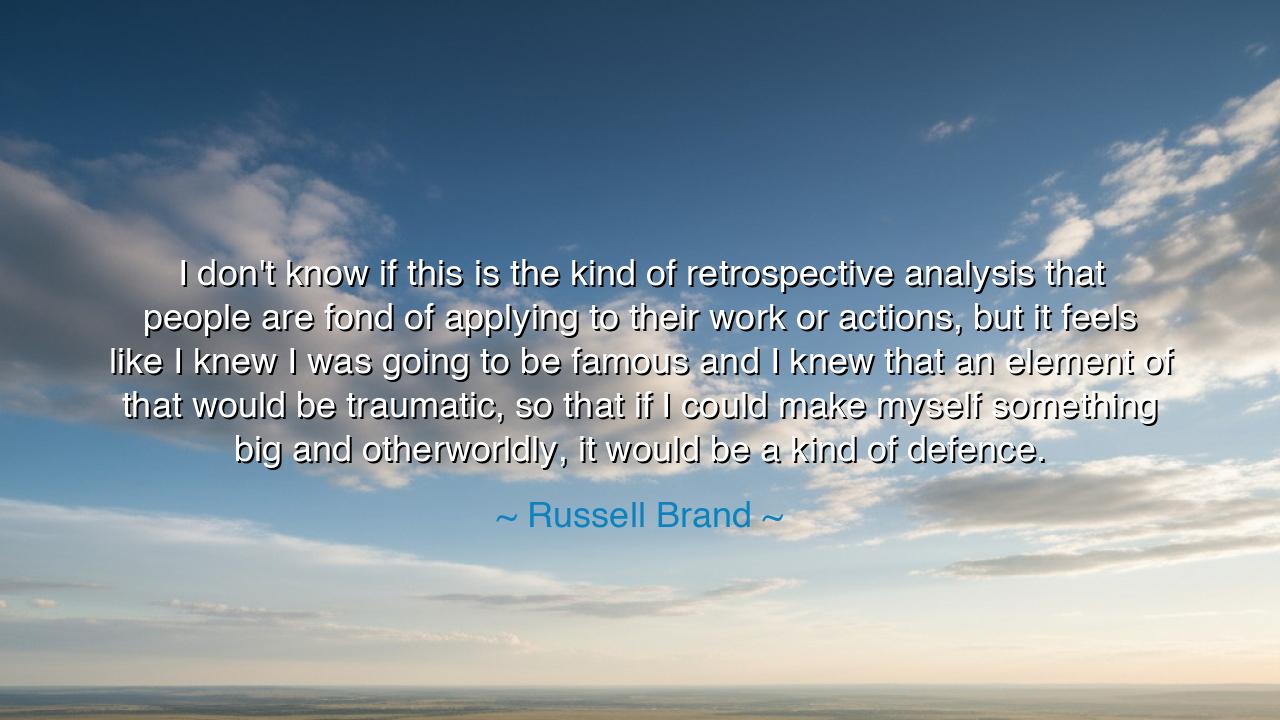
I don't know if this is the kind of retrospective analysis that
I don't know if this is the kind of retrospective analysis that people are fond of applying to their work or actions, but it feels like I knew I was going to be famous and I knew that an element of that would be traumatic, so that if I could make myself something big and otherworldly, it would be a kind of defence.






Host: The room was quiet, with the soft rustle of pages filling the stillness. Jack sat with his legs crossed, looking over a quote he had just read. He seemed lost in thought, his fingers lightly tapping on the edge of his cup. Jeeny, sitting across from him, noticed the look on his face and set her book aside, sensing there was something deeper on his mind.
Jeeny: (gently) “You look deep in thought. What’s going on?”
Jack: (looking up slowly, a thoughtful expression on his face) “I was just reading something from Russell Brand. He said, ‘I don’t know if this is the kind of retrospective analysis that people are fond of applying to their work or actions, but it feels like I knew I was going to be famous and I knew that an element of that would be traumatic, so that if I could make myself something big and otherworldly, it would be a kind of defence.’ It really struck me — the idea of fame not just as a dream, but as a defense mechanism. It makes me think about how we often shape ourselves based on what we think we need to protect from the world.”
Host: Jeeny leans forward slightly, clearly intrigued by the deeper implications of the quote. The room feels a little more still, as if the words have opened up a space for reflection.
Jeeny: “It’s interesting, isn’t it? He’s almost saying that fame wasn’t just a goal for him, but something he knew he had to face in order to protect himself from the pain or vulnerability that comes with exposure. It’s like he saw fame as a shield, a way to protect his inner self by building up a larger-than-life persona around him. It makes me wonder how many of us do that — whether consciously or unconsciously — in order to shield ourselves from the world.”
Jack: (nodding) “Exactly. It’s like he’s saying fame wasn’t just about recognition or success, but about creating something bigger than himself, something almost otherworldly, to hide behind. There’s a certain vulnerability that comes with fame — people’s attention, expectations, and judgments. If you can turn yourself into something iconic, it’s like a barrier between your true self and the world.”
Host: Jeeny’s expression softens, her fingers lightly tracing the rim of her cup. The quiet in the room deepens, and it feels like they are both reflecting on the complexity of fame and self-protection.
Jeeny: “Maybe it’s that fear of being exposed, of being seen for who you really are, that drives people to create a larger-than-life persona. It’s safer to be this idea, this image, than to be vulnerable and risk being hurt. But it also comes with the cost of being disconnected from your true self.”
Jack: (thoughtfully) “Right. It’s a defense mechanism, but at the same time, it creates a kind of isolation. When you’re always in the public eye, and you’ve built this larger-than-life persona, it’s hard for people to see the real you, the person behind the fame. It’s like you’re protected from the world, but also separated from it.”
Host: The room feels quieter now, the weight of the conversation hanging between them. Jeeny’s eyes are soft, reflecting the understanding that fame, while it can offer protection, can also create distance — from others and from yourself.
Jeeny: “It’s a complex relationship, isn’t it? Fame can be a way of protecting yourself, but it can also trap you in this performance, where you’re never really able to just be yourself. It’s a defense, but also a kind of prison. I think that’s why so many famous people struggle with finding true connection or peace — because the shield they’ve built up makes it hard for anyone to see the person they truly are.”
Jack: (nodding) “Yeah, and maybe that’s why some people feel lost or empty even after achieving fame. If you’ve spent so much time building a persona that isn’t really you, it’s easy to feel disconnected from who you truly are underneath.”
Host: The room settles into a thoughtful silence, the realization that fame, while offering protection, can also create a barrier between one’s true self and the world. Russell Brand’s words serve as a reminder that our defenses, whether they’re fame, success, or any other mask, may shield us from vulnerability but also keep us from truly connecting with others — and with ourselves.






AAdministratorAdministrator
Welcome, honored guests. Please leave a comment, we will respond soon